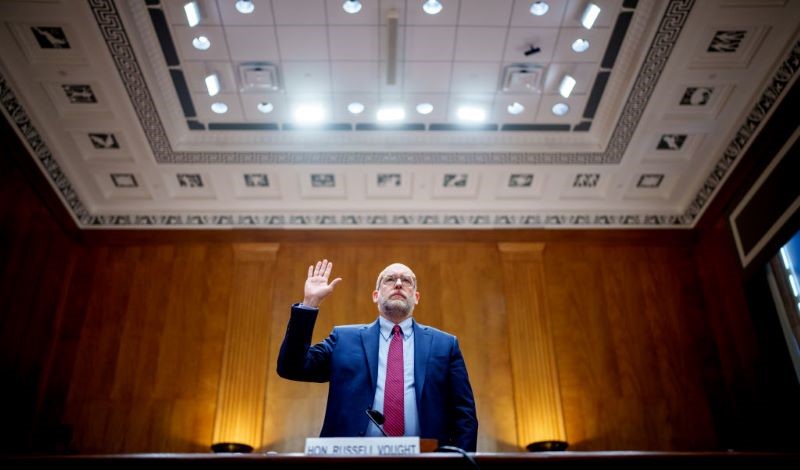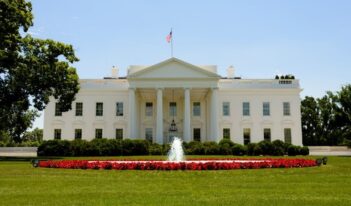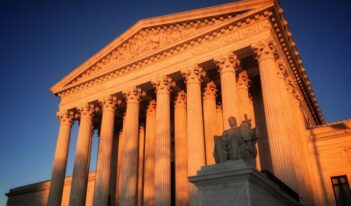
Russell Vought’s influence on the second Trump Administration cannot be ignored.
The theory that President Donald J. Trump was surprised by his victory in 2016 has persisted because the first 100 days of his first term were shambolic. Among his first hires were Ivanka Trump, his daughter, and Jared Kushner, his son-in-law, who assumed positions as unpaid advisors despite their lack of relevant experience. They remained until the bitter end.
Trump 2 could not have been more different. The victor strode into office with furious determination, appointing a full slate of loyalists to top positions, all of whom were approved quickly by U.S. Senate Republicans. Once in place, they released such a tsunami of controversial initiatives that Democrats were dumbfounded. Litigation commenced, and federal courts are now coping with dozens of lawsuits.
This essay focuses on the ideology of Russell Vought, director of the Office of Management and Budget (OMB), who took his place among a handful of the most powerful officials serving President Trump. He has played a key role in the preparation of hundreds of executive orders and memos during the hiatus between President Trump’s terms that are designed to implement a drastic change of the federal government as we have known it. Readers may think they know about Vought, and they may be right, but I suspect that unless people have carefully examined the journalistic profiles that dig into his stated beliefs, they underestimate what he is determined to accomplish.
Vought graduated from Wheaton College—a private, non-denominational Christian liberal arts college in Illinois also attended by Christian evangelist Billy Graham—and The George Washington University Law School. Unlike many Trump appointees, Vought spent 20 years becoming a seasoned Washington insider. He worked as a legislative assistant to U.S. Senator Phil Gramm (R-Tex.) and U.S. Senator Chuck Hagel (R-Neb.), policy director for U.S. Representative Jeb Hensarling (R-Tex.), executive director of the Republican Study Committee in the U.S. House of Representatives, and policy director for the House Republican Conference.
Vought left Capitol Hill for a job with Heritage Action, an offshoot of the Heritage Foundation. Founded in 2010 and operated as a 501(c)(4) organization, its mission aims “to fight for conservative policies in Washington, D.C. and in state capitals across the country. We turn ideas into bills and bills into law.” Heritage Action grassroots activists are called “sentinels,” as in militant guardians of conservative beliefs about government.
During Trump 1, Vought served as OMB’s deputy director under former Representative Mick Mulvaney (R-S.C.). When Mulvaney left to become President Trump’s acting chief of staff in 2020, Vought moved up to director. Just before President Trump left office in 2020, Vought helped engineer the adoption of a Schedule F executive order that would convert thousands of federal jobs to “at will” employment, but he ran out of time to implement the policy. In retrospect, this effort was one of his few mistakes. Not only did President Joseph R. Biden rescind the order, but the U.S. Office of Personnel Management issued a regulation under President Biden blocking its reinstatement. President Trump attempted to revive it by executive order during his second term, but opponents have filed three separate lawsuits challenging it. OPM recently proposed a rule that would implement the executive order.
In 2021, Vought founded the Center for Renewing America. The Center’s 2024 annual report explained that the organization was “guided by its mission to put God, country, and community at the center of the policy debate.”
At an invitation-only meeting of the Center in 2023 that was reportedly recorded without Vought’s permission—a video of which was released by ProPublica and Documented—he did not seem to mince words about the goals of Trump 2:
We want the bureaucrats to be traumatically affected. When they wake up in the morning, we want them to not want to go to work because they are increasingly viewed as the villains. We want their funding to be shut down so that the EPA can’t do all of the rules against our energy industry because they have no bandwidth financially, to do so. We want to put them in trauma.
Vought was impressively productive during the four years between President Trump’s terms. He authored a crucial chapter of Project 2025’s Mandate for Leadership: The Conservative Promise, explaining his ideas about the overarching power of the President in contrast to Congress and the judiciary: “The great challenge confronting a conservative President is the existential need for aggressive use of the vast powers of the executive branch to return power—including power currently held by the executive branch—to the American people.” He reportedly wrote a confidential 180-day battle plan to enable Trump 2 to hit the ground running, and he prepared a blueprint for nine trillion dollars in budget cuts over the next ten years.
These efforts mirror the Administration’s most important initiatives regarding the operation of the federal government: impoundment of money appropriated by Congress; dismissal of thousands of federal workers without regard to civil service protections; and abolition of independent agencies led by members who can only be dismissed for cause.
President Trump announced his intention to nominate Vought as OMB director for a second time on November 22, 2024—weeks before he was inaugurated for his second presidential term. He stated in support of his nomination that Vought “knows exactly how to dismantle the Deep State and end Weaponized Government, and he will help us return Self Governance to the People.” The Senate confirmed Vought on February 10, in a party line vote of 53 to 47— with all Republicans in support and all Democrats opposed.
Vought’s relatively low profile and work ethic have made him one of the most powerful, least visible people in the White House. He is allied with Stephen Miller, a deputy chief of staff who called Vought a “transformative pick.”
What casual observers probably do not realize is that Vought’s apparent ultimate goal is to bring tenets of Christian nationalism into government and governing. The introduction to his 104-page budget proposal, which he penned prior to his appointment to OMB, opens with the following passage from 1 Samuel 8:10-18:
He will take the best of your fields and vineyards and olive orchards and give them to his servants. He will take the tenth of your grain and of your vineyards and give it to the officers and to his servants. … He will take the tenth of your flocks, and you shall be his slaves. And in that day, you will cry out because of your king, whom you have chosen for yourselves.
The “king” in this passage is apparently not the all-powerful presidency Vought supports, but its primary target, the so-called Deep State.
In a column published by Newsweek and titled “Is There Anything Actually Wrong with ‘Christian Nationalism?’” Vought endorsed:
An orientation for engaging in the public square that recognizes America as a Christian nation, where our rights and duties are understood to come from God … It is a commitment to an institutional separation between church and state, but not the separation of Christianity from its influence on government and society.
The most extreme version of Christian nationalism holds that God inspired the creation of the United States and guided the drafting of both the Declaration of Independence and the U.S. Constitution. The philosophy propounds that the constitutional separation of church and state must be eliminated and that laws should be based on Christian values. Overall, 81 percent of white evangelicals endorse this vision compared to 45 percent of all Americans. Because Vought does not demand dissolution of the constitutional separation of church and state, he seems to be moderate. Yet his insistence that Christianity must have an “influence” on government and society blurs this characterization.
Vought’s Newsweek column embraces the work of Yoram Hazony, a far-right conservative best known for his militant definitions of “nationalism.” Hazony’s theories were used to revive the “America First” precepts supported by President Trump, Vought, and the “Make American Great Again” world. President Woodrow Wilson coined the “America First” label in 1915 to keep America out of World War I. More than a century later, Trump 2 invokes it to justify protectionist trade policy and dismantle the U.S. Agency for International Development. The America First Policy Institute, a non-profit organization based in the Washington, D.C. area, articulates America First values of “American military superiority, foreign-policy engagement in the American interest, and the primacy of American workers, families, and communities in all we do.”
But perhaps the final word on the implications of Christian nationalism for the nation as a whole should be left to a project of the Edmund Burke Foundation, chaired by Hazony, called “National Conservatism”— an effort to help conservatives around the world make sense of the “nationalism” that is sweeping the developing world. In a statement of principles signed by many of the Foundation’s leading lights, including Vought and Hazony, the group declared:
No nation can long endure without humility and gratitude before God and fear of his judgment that are found in authentic religious tradition. … The Bible should be read as the first among the sources of a shared Western civilization in schools and universities, and as the rightful inheritance of believers and non-believers alike. Where a Christian majority exists, public life should be rooted in Christianity and its moral vision, which should be honored by the state and other institutions both public and private.
This essay is part of a series, titled “President Trump’s First 100 Days of Deregulation.”




